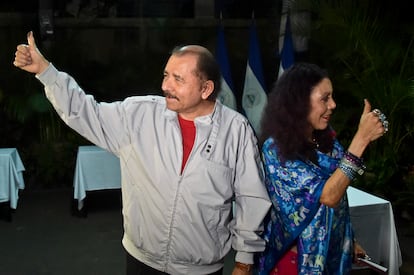The Ortega and Murillo regime in Nicaragua arrests bishop who defended political prisoner
The ruling Sandinista apparatus has redoubled its persecution of the Catholic Church. The detention of Mora Ortega is the second such move against a religious leader after Rolando Álvarez was jailed last year


A day after Bishop Isidro del Carmen Mora Ortega said that the Episcopal Conference of Nicaragua (CEN) “remains in prayer” for Monsignor Rolando Álvarez — a political prisoner held by the regime of Daniel Ortega and Rosario Murillo — the police arrested him. They took him away on Wednesday, December 20, when he was heading to his parish in the municipality of La Cruz de Río Grande, along the South Caribbean Coast.
Monsignor Mora Ortega is now the second bishop who has been arrested by the Sandinista National Liberation Front’s regime. President Ortega and his wife, Vice President Murillo, have redoubled their persecution of the Catholic Church. They are specifically targeting the highest ecclesiastical authorities. First, the presidential couple ordered the arrest of Monsignor Álvarez, head of the Diocese of Matagalpa, and sentenced him to 26 years in prison in February of 2023. This was after he refused exile in the United States. Bishop Álvarez, a symbol of resistance against the Sandinista dictatorship, was charged with the crimes of “treason,” undermining national integrity and “propagating false news.”
In the case of Bishop Mora Ortega, who leads the Diocese of Siuna, it’s not yet known what he’s been accused of or where he’s being held. Uniformed officers detained him when he was on his way to officiate the confirmations of 230 parishioners of La Cruz de Río Grande. Martha Patricia Molina, a Nicaraguan lawyer and author of the study Nicaragua: A Persecuted Church?, reported that seminarians Alester Sáenz and Tony Palacios were also abducted.
What triggered the arrest of Monsignor Mora Ortega was that he publicly expressed solidarity with Bishop Álvarez, who is isolated in a cell within the notorious La Modelo prison. “I would like to express the greetings of the Episcopal Conference. We are always united, praying for this beloved Diocese of Matagalpa, praying for Monsignor Rolando, praying for the journey of each one of you (his parishioners). We’re united in prayer, in communion, in faith, in love, in tenderness,” said the religious figure, during the mass commemorating the 99th anniversary of the creation of the diocese.
The Diocese of Matagalpa, according to the words of Bishop Mora Ortega, is “a quarry of faith. It needs that drive of the layman, who assumes the mission with love, with joy.” He then quoted the parable of the Good Shepherd: “The shepherd leaves the 99 others and searches high and low for the lost sheep. We live in times, brothers and sisters, when you have to leave one to go in search of the 99.”
Isidro del Carmen Mora Ortega was ordained as a priest in 2003. In April of 2021, he was appointed bishop of the Diocese of Siuna. Previously, he was vicar general of the Diocese of Matagalpa and parish priest of the San Ramón Nonato Church, in the same northern region of the country.
“Sometimes, we find discouragement. But how nice it is to always find people of faith, people who are there in silence, people who are there serving the Church, people who are there persevering, people who are there taking responsibility,” the Bishop preached.
“I like when people talk about the Good Shepherd. The Good Shepherd, who gives his life for his sheep,” he continued, referring to the belief of the parishioners, which has been maintained despite the criminalization of the profession of the Catholic faith imposed by the Sandinista regime.
The Ortega-Murillo administration maintains its crusade against the Catholic Church on all fronts. This past November 29, Father Jairo Antonio Mercado Pavón, a priest who was returning to the country after a pastoral trip to the United States, was denied entry to his homeland of Nicaragua. There are currently 84 exiled priests in total. Meanwhile, police have banned more than 3,000 street processions in the country since Easter, when dozens of parishioners were arrested.
Sign up for our weekly newsletter to get more English-language news coverage from EL PAÍS USA Edition
Tu suscripción se está usando en otro dispositivo
¿Quieres añadir otro usuario a tu suscripción?
Si continúas leyendo en este dispositivo, no se podrá leer en el otro.
FlechaTu suscripción se está usando en otro dispositivo y solo puedes acceder a EL PAÍS desde un dispositivo a la vez.
Si quieres compartir tu cuenta, cambia tu suscripción a la modalidad Premium, así podrás añadir otro usuario. Cada uno accederá con su propia cuenta de email, lo que os permitirá personalizar vuestra experiencia en EL PAÍS.
¿Tienes una suscripción de empresa? Accede aquí para contratar más cuentas.
En el caso de no saber quién está usando tu cuenta, te recomendamos cambiar tu contraseña aquí.
Si decides continuar compartiendo tu cuenta, este mensaje se mostrará en tu dispositivo y en el de la otra persona que está usando tu cuenta de forma indefinida, afectando a tu experiencia de lectura. Puedes consultar aquí los términos y condiciones de la suscripción digital.








































